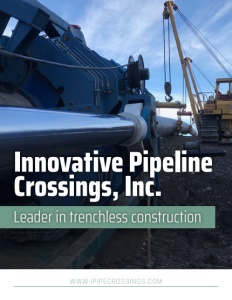Innovative Pipeline Crossings, Inc.
Leader in trenchless construction
Business View Magazine interviews Peter Hennig, President & CEO of Innovative Pipeline Crossings, Inc., for our series on Trenchless Technologies.
Innovative Pipeline Crossings (IPC) has the technical expertise, the passion, and the commitment to excellence to tackle the most complex tunneling projects, while providing superior value and service to clients. IPC’s trenchless tunneling technology combines the advantages of established pipelaying methods with innovative new applications for industries such as oil and gas, as well as municipal and civil works. The company’s professional team provides a wide-range of solution-focused pipeline technologies that make demanding geological challenges doable, safe, and successful.
IPC is a part of the Bothar Group of Companies, an international contractor with over 30 years of experience in the tunneling contracting industry. With an enviable track record and a highly skilled and diverse capability range, together, the staff at IPC and Bothar bring an exceptional track record and highly skilled capabilities to all tunneling projects. Services include Microtunneling, Auger Boring, Pipe Jacking, Shaft Construction, and Direct Pipe Installation.
Peter Hennig, IPC President & CEO shares the history of the company. “IPC was founded in 2013 in Calgary, Alberta with the idea of using Direct Pipe technology that was developed in Germany by Herrenknecht, the market leader for tunneling equipment manufacturing. IPC started with two projects and then the downturn in the economy came, and the oil and gas sector took a major hit in Alberta. In April 2016, I came over as VP Operations to help turn the business around, which we did and executed more Direct Pipe Installations in Canada than anybody else, in the meantime. In November 2018, we amalgamated with a strategic partner, the Bothar Group, one of the biggest micro-tunneling contractors in the world. Their headquarters is in Brisbane, Australia, and we are their local subsidiary in North America.”
The Bothar Group has offices in the Middle East, Asia, Europe, Africa, and North America; operating globally with about 1,000 employees of 32 nationalities. IPC has a yard, workshop, and one office in Calgary with a regular staff of 25 employees that increases with temporary hires when the company moves onto a project. Hennig explains, “You don’t find a lot of skilled laborers and contractors for what we do, so we’ve been training a lot of people over the last three years and we keep bringing them back to our projects. As we grow, we try to take on more of those temporary hires into full-time positions. We also work with local subcontractors (crane operators, welders, etc.), but the people working with the tunneling equipment are directly employed with us.”
IPC has engaged projects across Canada and internationally which involve all aspects of EPC (engineering, procurement, and construction), depending on client needs and the scope of the project. The DPI (Direct Pipe Installation) one-pass system is a patented process developed out of Herrenknecht in Germany. There are only a few contractors in the world who use that application of tunneling technology, mainly for pipeline construction. Direct Pipe is very applicable to the Canadian oil and gas market, but IPC does other types of tunneling for municipal work on infrastructure programs such as wastewater, fresh water, and utility tunnels in major cities.
The wide variety of geological conditions throughout Canada, whether tunneling in the Canadian Shield or a river valley, present challenges that require modifications to how IPC uses their equipment and the speed at which they can tunnel. The team uses the local geological data from bore holes to determine the appropriate cutter head type and best formation of the cutter discs, depending on the soil conditions found along the tunnel path. Tunnelling through sand or clay requires a different head then solid granite or hard rock conditions. Every project is unique and requires diligent preparation for success.
Also challenging in Canada is the climate. As Hennig notes, “Working in minus temperatures is challenging to keep any kind of equipment running. Most of our projects, especially those executed in the oil and gas sector, were in winter conditions. That’s when most of those projects proceed in Canada – when the ground is frozen. But when we work in the Middle East and it’s 55 degrees Celsius, that comes with its own challenges as well.”
On the “green” front, DPI and micro-tunneling technology and their different applications have a much smaller environmental footprint than other trenchless technologies, when it comes to use of water and recycling of other by-products such as bentonite. The overall consumptions are 70 to 80 percent less than with other comparable technologies. Also, project duration time is usually significantly shorter, so the amount of energy used in a project is much smaller – a benefit to the environment and sustainability.
When asked about the competitiveness of the trenchless industry, Hennig notes that “Interestingly, most market participants in the trenchless tunneling industry become friends, because we all go through the same challenges. We have a good global community, where everybody tries to help each other. We might battle in bidding over a project, but once it’s awarded, we sit back. I like to think we have good relationships with the contractors and are all there for each other if someone needs a hand.”
Because there is no standard around Direct Pipe Installations available in Canada, IPC had to set up its own training; taking the provincial safety legislation and designing its own standard operating procedures, such as their confined space entry and rescue program. Hennig acknowledges, “As we grow as a company and take on more people, we also have to grow in the field of training and education in this technology. And a strong safety environment is just one component in defining our company culture. We try to have a culture of involvement, of giving our staff an opportunity to raise their opinions and be involved in developing what we’re doing. It’s not up to me, as the CEO, to tell everybody how to do their jobs. These people have worked with the equipment on a daily basis and they must have a chance to say how things should be done to make it more efficient, safe, and to improve how they work.”
Direct Pipe, in particular, is mostly an oil and gas application. There are presently two pipeline owners in North America actively building pipelines in the diameter range suitable for this application, and the technology is still somewhat new to them. Which means that repeat work for IPC has been slow to kick in. “We’re now looking into sufficient back-to-back project opportunities with those pipeline owners to allow us to synchronize our activities and be more efficient for our own benefit but also for the client,” says Hennig. “The more work opportunities you have, the more you can have people working with the equipment on those projects, and the more skilled and professional they become. Our goal as a company is to continue to put Canadians into work.”
But as IPC expands their capability, they are also looking more into the opportunities for work in infrastructure development. “There is a lot of potential in terms of the expansion in infrastructure requirements happening in Canadian municipalities. We want to be a part of building the underground infrastructure needed for people to maintain their quality of life – and be proud to be part of Canadian city development.”
A key element to the company’s success is the quality equipment manufactured by Herrenknecht. IPC considers them a valuable partner with whom they have a great mutual relationship. In addition, vendors, such as Frontier Petroleum, and local subcontractors, are vital to IPC. Hennig gives them full credit: “We couldn’t do it without them, it’s all teamwork. We grew the business significantly over the past three years from seven figure revenue into high eight figure revenue for this year, and we’re looking positively into the future. This new ownership with the Bothar Group has helped us to drive the business forward, with their available resources being added to our capacity.”
Speaking to future goals, Hennig reports, “We are a young company, still, in the scheme of things. And we’re growing; looking for eager and ambitious people to join our company that can meet our culture and our requirements. It is a very demanding niche industry we’re working in, so you need to have thick skin. We’re a dynamic, 24/7 business, it’s not an 8 to 5 job. We are passionate about what we do in this industry, in this company, and in this Group of companies with Bothar. We are very much aligned in understanding that we do whatever it takes to keep the client happy. We take away our lessons learned and look to improve constantly.”
AT A GLANCE
Who: Innovative Pipeline Crossings, Inc.
What: Trenchless tunneling solutions specialists
Where: Headquarters in Calgary, Alberta
Website: www.ipipecrossings.com
PREFERRED VENDORS
Frontier Petroleum – www.frontierpetroleum.ca
Operating across Canada, Frontier Petroleum is an experienced, fully insured and TSSA-licensed company, specializing in petroleum construction, environmental services and terminal remediation services. Frontier Petroleum was founded in 2006 and works predominantly in the Oil & Energy sector supporting fuel terminals and pipeline activities across Canada. Its head office is in Ottawa, Ontario with full-service shops in Ottawa and Toronto and crews spread across Canada.
Frontier Rescue, a division of Frontier Petroleum, provides confined space rescue services across Canada. It specializes in on-site attendant and rescue services, risk and hazard assessment, monitoring, ventilation, control and training. The company has crews of highly trained confined space rescue specialists supporting all sectors.
The companies’ clients include TransCanada, Shell Canada, Suncor Energy, Esso, the International Airport Authority and Ultramar.



